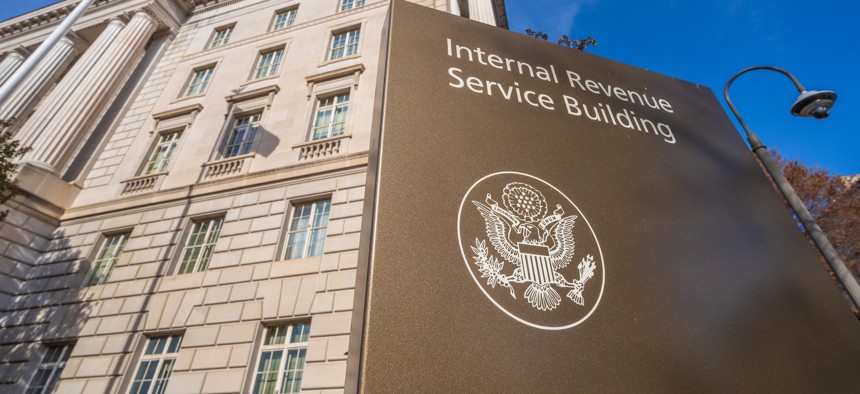IRS has ‘unconscionable delays’ in helping identity theft victims, taxpayer advocate says

J. David Ake/Getty Images)
The average wait time for taxpayers trying to resolve fraudulent returns, coupled with legitimate filers being mistakenly flagged as fraudulent, has become a top challenge for the IRS, according to a new report.
Victims of identity theft had to wait over a year and a half on average for the IRS to resolve their cases and to get their tax refunds in fiscal 2023, according to a new report from the National Taxpayer Advocate, an independent IRS organization focused on taxpayer issues and rights.
At the end of last year, the IRS still had about 484,000 more cases remaining in its Identity Theft Victims Assistance unit to work through.
As a result, National Taxpayer Advocate Erin Collins has included IRS handling of identity theft issues and “unconscionable delays in assisting victims” as a top-ten challenge for the IRS — a change from last year — in her recently released annual report.
All this comes as reports of identity theft are on the rise, according to Federal Trade Commission data.
The IRS assistance program is designed to help taxpayers when they realize they’ve been a victim of identity theft, often something discovered by victims when the IRS rejects their tax return because another one has already been filed with their Social Security number, according to the report.
But those seeking help had to wait about 19 months on average in fiscal 2023 for the IRS to close their case and send them their refunds, the new Taxpayer Advocate Report states.
Part of the reason for the delays, according to the new report, is that the IRS reassigned nearly 600 identity theft IRS workers to answer phone lines in fiscal 2023.
This might have been “understandable” at the time, “but we are now more than three years from the beginning of the pandemic,” Collins writes. “The IRS should be able to figure out how to provide taxpayers with the customer service they need without siphoning it from other critical programs.”
Collins also raised concerns about another group of taxpayers — legitimate filers who are flagged by the IRS as potentially fraudulent, requiring them to verify their identity and tax return to get their refund.
In 2022, the IRS suspended 4.8 million returns, about 2 million of which were confirmed as identity theft. That left over 2.5 million that could have been submitted by fraudsters or submitted by real taxpayers who were confused by IRS instructions, couldn’t verify themselves or didn’t even get the letter in the first place, the report states.
Collins urges the IRS in the new report to fix the screening mechanism it uses on tax returns so that fewer legitimate filers get flagged as potential identity thieves.
In calendar year 2022, the IRS achieved its goal of a false detection rate below 50%, but that rate has been as high as 62% in calendar year 2020, for example.
Flagged taxpayers get letters with instructions to verify their identities, with the most common of such letters giving recipients the option to do so online with vendor ID.me, over the phone or in-person, according to the report.
The IRS won’t process these returns until the person in question verifies themselves, but the taxpayer advocate says that “taxpayers experience difficulties authenticating their identity and return information.”
In 2022, it took an average of 46 days for people to verify themselves, the report states, and the IRS and Taxpayer Advocate Service are working on a survey to understand why.
Collins also flagged low response rates to the letters sent to flagged filers and IRS processing delays in issuing pin numbers meant to protect taxpayers from identity theft as points of concern. These numbers, called identity protection pins, are also underutilized overall, the report argues.
“For those individuals or businesses that have been victims of identity theft, it is a difficult, unpleasant and emotional experience,” the report reads. “The IRS should do everything possible to timely assist these victims and provide them with the peace of mind that the IRS is looking out for their best interests and protecting their rights.”
IRS Commissioner Danny Werfel said in a statement that IRS leadership will be reviewing the report and noted that “the IRS continues to hire additional staff to help improve taxpayer service, add technology tools and improve compliance efforts as well as focusing on paperless processing” with funding from the Inflation Reduction Act.






